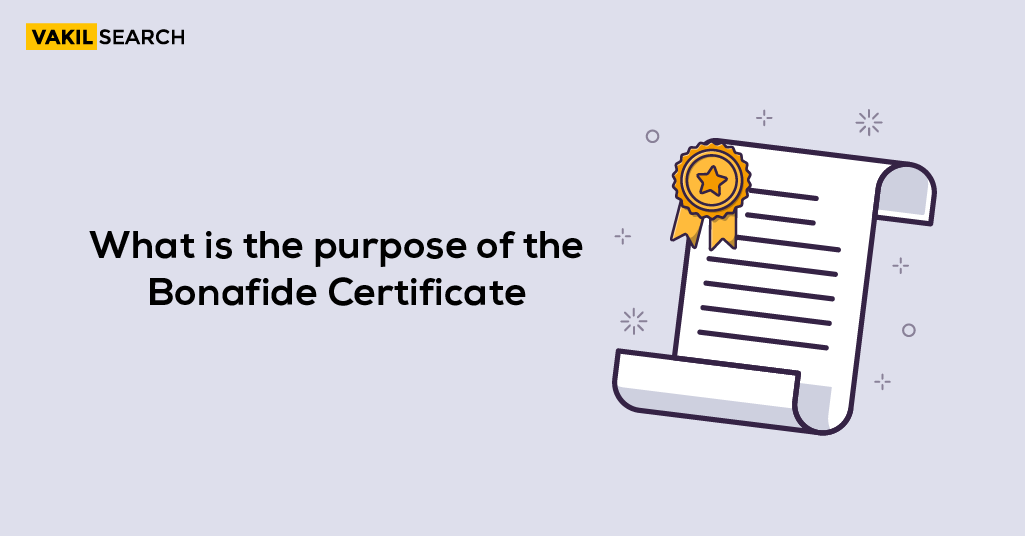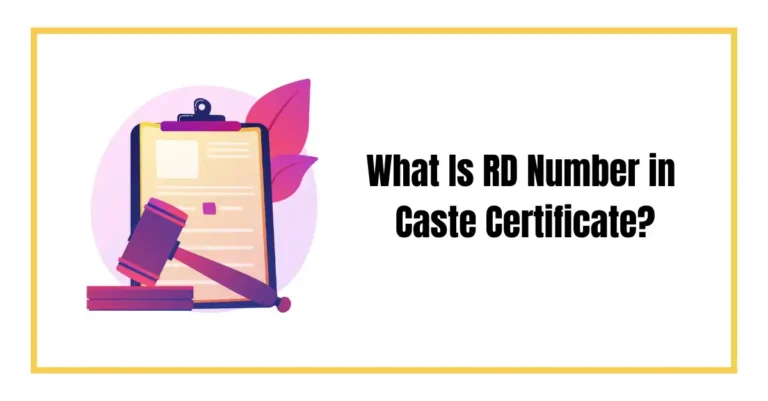Discover the far-reaching significance of the Bonafide Certificate beyond academia. From student verification to employment validation and legal matters, understand its impact on life's crucial junctures.
Introduction
In the labyrinth of administrative procedures and documentations, the Bonafide Certificate stands out as a document with a distinct purpose. Its role extends beyond being a mere piece of paper, and it holds significance in various spheres of life. This article delves into the multifaceted purpose of the Bonafide Certificate, exploring its importance in education, employment, and other aspects of an individual’s journey.
Understanding the Bonafide Certificate
The Bonafide Certificate, commonly known as a ‘bona fide letter’ or ‘letter of bona fide,’ is an official document issued by an institution or organisation to certify the authenticity of a person’s claims or status. It typically contains information about the individual’s association with the institution, including enrollment details, duration of affiliation, and other pertinent information. The document serves as a confirmation of the person’s genuine connection with the issuing entity.
Establishing Affiliation
Students: For students, a Bonafide Certificate serves as an official document proving their enrollment in a specific educational institution. It typically includes details like name, date of birth, course enrolled in, year of study, and sometimes, even academic performance. This document comes in handy during various situations, such as:
- Applying for scholarships, educational loans, or travel visas.
- Participating in conferences, workshops, or competitions.
- Obtaining discounts on travel or merchandise for students.
- Providing proof of residence in student hostels or rented accommodations.
Employees: Similarly, for employees, a Bonafide Certificate verifies their employment status within a company. It usually mentions the employee’s name, designation, department, date of appointment, and duration of employment. This document proves valuable for:
- Applying for loans or mortgages.
- Obtaining travel visas or work permits abroad.
- Claiming insurance benefits or compensation schemes.
- Verifying employment details for rental agreements or other legal purposes.
Beyond Education and Employment
While the majority of Bonafide Certificates are issued for academic and professional purposes, their reach extends beyond these boundaries. Individuals may require one for:
Marriage Registration: Some marriage registrars demand proof of residence for both partners, and a Bonafide Certificate from a current employer or educational institution can fulfil this requirement.
Property Matters: When dealing with inheritance or property claims, proving residency or relationship to the deceased may involve presenting a Bonafide Certificate.
Legal Disputes: In certain legal proceedings, establishing identity and residency becomes crucial. A Bonafide Certificate can act as a valid document for such verification.
Educational Context
Verification of Student Status:
In the domain of education, the Bonafide Certificate plays a pivotal role in verifying a student’s enrollment and status within an educational institution. This document is often required for various purposes, such as applying for scholarships, seeking educational loans, or participating in academic events.
Addressing Transfer Requests:
Educational institutions may issue Bonafide Certificates when students request transfers to other schools or colleges. These certificates act as a formal acknowledgment of the student’s academic history, ensuring a smooth transition between educational institutions.
Internships and Training Programs:
When students pursue internships or training programs, employers may request a Bonafide Certificate to confirm the student’s enrollment and the period of association with the educational institution. This certificate adds credibility to the student’s application and enhances their chances of securing valuable opportunities.
Professional Arena
Employee Verification:
In the professional world, organisations may request Bonafide Certificates from employees to validate their educational qualifications and professional credentials. This is particularly crucial during the hiring process when employers seek assurance regarding the accuracy of the information provided by prospective employees.
Visa and Immigration Procedures:
Individuals planning to study or work abroad often encounter visa and immigration requirements that demand proof of their educational background. A Bonafide Certificate becomes a key document in such scenarios, serving as evidence of the person’s enrollment in an educational institution.
Professional Courses and Certifications:
Professionals pursuing additional courses or certifications may be asked to furnish a Bonafide Certificate to verify their current professional status. This is common in fields where continuous learning and skill development are integral to career progression.
Legal and Administrative Use
Legal Proceedings:
In legal matters, the Bonafide Certificate can be used as evidence to substantiate claims or establish facts. For instance, in cases related to inheritance or property disputes, the certificate may be presented to demonstrate the relationship of the individual with a specific institution.
Government Documentation:
Various government processes and documentation requirements may necessitate the submission of a Bonafide Certificate. This is particularly true for procedures related to obtaining government scholarships, grants, or other benefits tied to educational qualifications.
Proof of Residence:
In some instances, a Bonafide Certificate may be accepted as a valid proof of residence, especially when the certificate includes details about the individual’s current address. This can be beneficial for individuals who have recently relocated and need to establish their residential status.
Who Should Possess a Bonafide Certificate?
Bonafide certificates are essential for various individuals and organisations, each needing them for specific purposes. Here’s a breakdown of who commonly requires these certificates:
Students:
Students often need bonafide certificates for educational reasons. These include applying for scholarships, securing loans, attending conferences or workshops, pursuing higher education abroad, or taking competitive exams.
Educational Institutions:
Schools and colleges may require bonafide certificates from their students. These are used for record-keeping, issuing official documents like transcripts or migration certificates, or confirming a student’s enrollment status.
Employers:
Employers may ask for bonafide certificates from employees to verify employment details and work experience. They are also useful for background checks during the hiring process.
Government Agencies:
Government bodies might request bonafide certificates for various needs. These can include accessing government schemes or benefits, obtaining local identity cards, or proving residence for official documentation.
Banks and Financial Institutions:
Banks and financial institutions might require bonafide certificates to confirm a student’s or employee’s identity, address, and connection with an educational institution or organisation when opening bank accounts or using financial services.
Immigration Authorities:
When applying for visas, passports, or other travel documents, immigration authorities often need bonafide certificates. These certificates confirm an individual’s association with an educational institution or organisation.
The requirements for bonafide certificates can vary based on the purpose and the requesting entity. Typically, the issuing authority, like an educational institution or organisation, will provide the necessary guidelines and format for obtaining the certificate.
Documents Required for a Bonafide Certificate
The documents needed for a bonafide certificate in India can vary depending on the policies of the issuing institution or organisation. However, some common requirements include:
Application Form:
A filled and signed application form is essential. You can get this form from the administrative office or relevant department. Some institutions might also need a written application.
Proof of Identity:
A valid document proving your identity is required. This could be an Aadhaar card, voter ID card, passport, or PAN card.
Proof of Residence:
Documents that confirm your residential address are necessary. These can include an Aadhaar card, voter ID card, ration card, electricity bill, or rent agreement.
Course/Program Details:
Institutions might ask for details about the course or program you’re enrolled in. This could include the course name, duration, admission or registration number, or semester information.
Fee Receipt:
Some institutions may request a copy of the fee receipt or proof of payment. This helps confirm your current student status or that you’ve met your financial obligations.
Application Process for Bonafide Certificate
The process of applying for a bonafide certificate can vary slightly depending on the institution or organisation. However, the general steps are as follows:
1. Obtain the Application Form:
Visit the administrative office or relevant department to get the bonafide application form. Some institutions may also offer an online application option.
2. For Students:
Contact the concerned department for information about the process. Write a simple request letter to the head of the institution or use the prescribed format. First-year and direct second-year students may need to attach a leaving certificate from their previous college.
3. For Employees:
Write a request letter to the head of your organisation. This letter should state your need for a bonafide certificate.
4. Fill in the Required Details:
Accurately complete the application form with personal details, course or employment specifics, the purpose of the certificate, and any additional required information.
5. Attach Supporting Documents:
Include copies of necessary documents such as a valid ID proof (Aadhaar card, passport, etc.), proof of residence (rent agreement, electricity bill, etc.), and any other specified documents.
6. Submit the Application:
Submit the completed application form along with the supporting documents to the designated office or department. Ensure all required documents are attached, and the form is properly signed.
7. Pay the Fee (if applicable):
If there is a fee for processing the certificate, make the payment at the designated payment counter or through the prescribed mode of payment.
8. Await Processing:
The institution will verify your details and process the request. Processing time may vary depending on the institution’s procedures and workload.
9. Collect the Bonafide Certificate:
Once processed, collect the certificate from the administrative office or designated department. Check that all the details on the certificate are correct.
The time to issue a bonafide certificate varies among institutions. It is issued on the institution’s printed letterhead and is duly signed and stamped.
FAQs
1. Why do educational institutions issue Bonafide Certificates to students?
Educational institutions issue Bonafide Certificates to verify a student's enrollment, academic standing, and other relevant details. These certificates are often required for purposes such as applying for scholarships, securing educational loans, or participating in academic events.
2. How does a Bonafide Certificate benefit employees in their professional endeavours?
For employees, a Bonafide Certificate serves as a validation of their employment status, confirming details such as designation, tenure, and department. This document is crucial when applying for loans, obtaining work visas, or fulfilling legal requirements related to employment verification.
3. Can a Bonafide Certificate be used for legal purposes?
Yes, a Bonafide Certificate can be used as evidence in legal proceedings. In cases of inheritance or property disputes, the certificate can establish the individual's relationship with a specific institution, providing valuable documentation to support claims and facts.
4. How does a Bonafide Certificate assist individuals planning to study or work abroad?
Individuals planning to study or work abroad often need to prove their educational background. A Bonafide Certificate serves as crucial evidence of enrollment in an educational institution, supporting visa and immigration applications, and ensuring a smoother international transition.
5. Is a Bonafide Certificate useful for establishing proof of residence?
Yes, a Bonafide Certificate can be accepted as proof of residence, especially when it includes current address details. This document becomes beneficial for individuals relocating or those requiring residential verification in legal or administrative processes, adding an extra layer of documentation reliability.
Conclusion:
In conclusion, the Bonafide Certificate is a versatile document that serves as a cornerstone in educational, professional, and legal spheres. Purpose of bonafide certificate extends far beyond a mere formality, influencing pivotal aspects of an individual’s life journey. From verifying student enrollment to facilitating international endeavours and aiding legal proceedings, the Bonafide Certificate stands as a testament to the authenticity of an individual’s affiliations and qualifications. As we navigate the intricacies of documentation, it is essential to recognise and appreciate the profound impact that this seemingly simple certificate can have on shaping various aspects of our personal and professional trajectories. Hope this article related to Purpose of Bonafide Certificate was helpful!
Related Articles,
- Do Colleges Give Bonafide Certificate?
- What Is a Bonafide Certificate in School Principal?
- Do We Need Bonafide Certificate for Passport?










